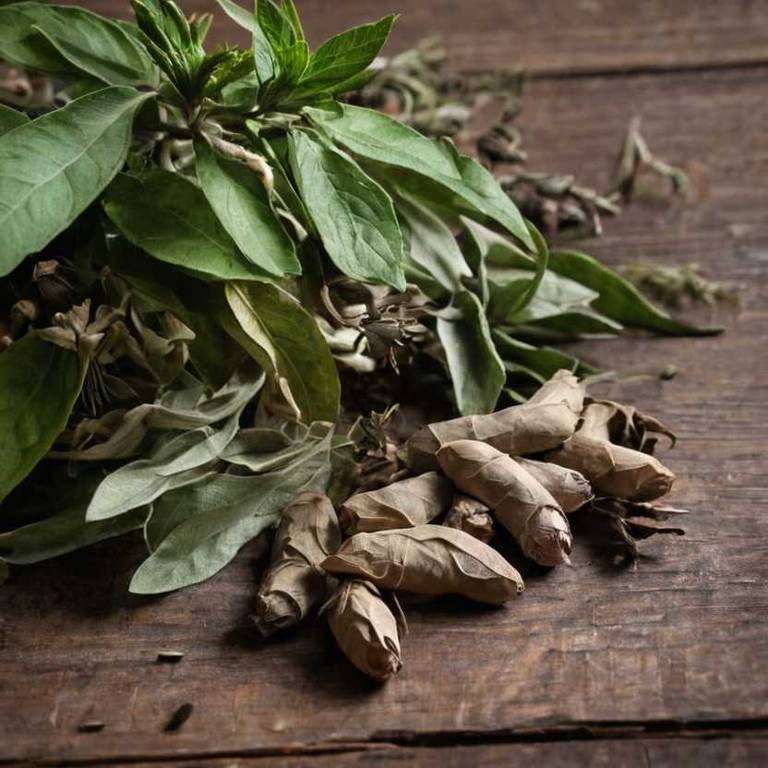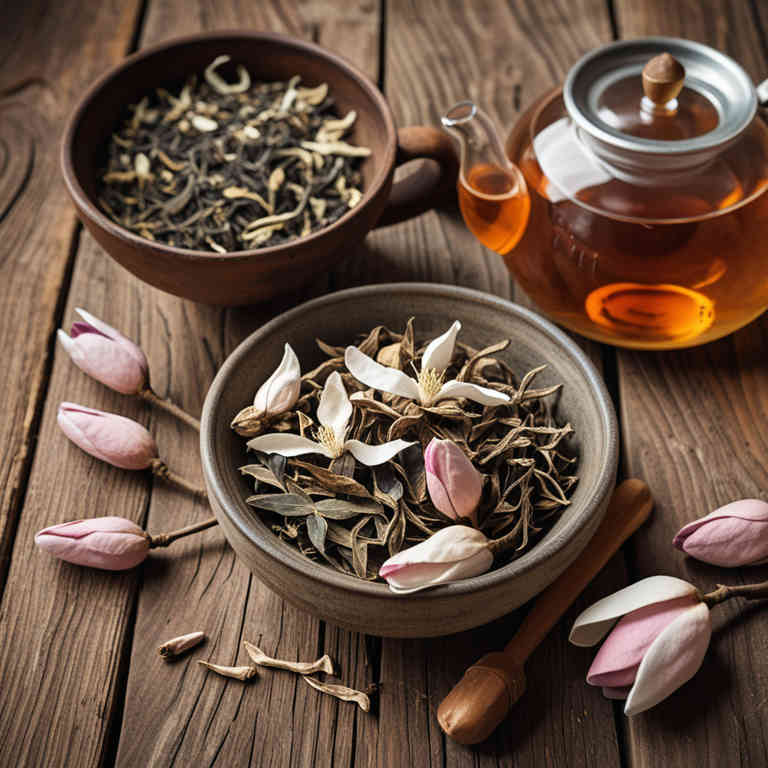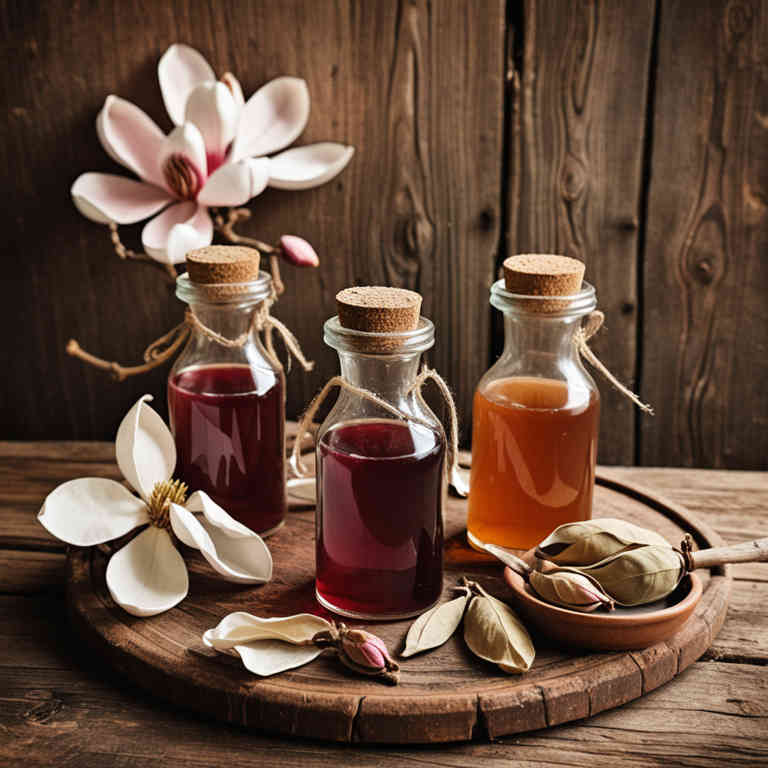10 Best Magnolia Officinalis Preparations

The best medicinal preparations of Magnolia officinalis are teas, decoctions, tinctures, creams, and syrups, each offering unique benefits for health and wellness.
Teas made from the dried flowers or bark are commonly used to soothe anxiety and promote relaxation.
Decoctions involve boiling the bark to extract its medicinal compounds, often used for digestive support.
Tinctures provide a concentrated form of the herb, ideal for quick absorption and potency.
Creams and syrups are applied topically or taken internally to address inflammation, stress, and respiratory issues.
These preparations highlight the versatility of Magnolia officinalis in traditional and modern herbal medicine.
Below there's a list of the 10 best herbal preparations of magnolia officinalis for medicinal purposes.
- 1. Teas
- 2. Decoctions
- 3. Tinctures
- 4. Creams
- 5. Syrups
- 6. Mucillages
- 7. Capsules
- 8. Lozenges
- 9. Oinments
- 10. Oils
1. Teas
Magnolia officinalis teas is commonly used to relieve symptoms of stress, anxiety, and insomnia due to its calming effects on the nervous system.
This herbal preparation is also used to treat digestive issues such as bloating, gas, and indigestion. Additionally, it has been traditionally used to alleviate menstrual cramps and reduce inflammation. The bioactive constituents responsible for these medicinal properties include compounds like magnolol, honokiol, and sesquiterpene lactones, which possess anti-inflammatory, antioxidant, and anxiolytic effects.
These compounds work synergistically to support mental and physical well-being.

2. Decoctions
Magnolia officinalis decoctions is commonly used to treat conditions related to the respiratory and digestive systems, as well as to alleviate stress and anxiety.
These decoctions are often employed in traditional medicine to address symptoms such as coughs, bronchitis, and gastrointestinal discomfort. They are also used to calm the nervous system and improve sleep quality. The bioactive constituents responsible for these effects include compounds such as magnolol, honokiol, and sesquiterpene lactones, which possess anti-inflammatory, antispasmodic, and anxiolytic properties.
These compounds contribute to the plant's ability to support respiratory health, reduce inflammation, and promote emotional well-being.

3. Tinctures
Magnolia officinalis tinctures is commonly used to treat anxiety, stress, and insomnia due to its calming effects on the nervous system.
These tinctures are also used for digestive issues, headaches, and skin conditions, owing to their anti-inflammatory and antispasmodic properties. The most common medicinal uses include alleviating symptoms of neurosis, reducing inflammation, and promoting relaxation. The bioactive constituents responsible for these effects include compounds such as magnolol, honokiol, and bisabolol, which have antioxidant, anti-inflammatory, and sedative properties.
These compounds work synergistically to provide the therapeutic benefits associated with Magnolia officinalis tinctures.

4. Creams
Magnolia officinalis creams is commonly used to alleviate symptoms of skin conditions, joint pain, and inflammatory disorders.
These creams are often applied topically to reduce inflammation, soothe irritation, and promote healing in conditions such as eczema, psoriasis, and arthritis. The most common medicinal uses include treating skin inflammation, muscle pain, and stress-related ailments due to its calming and anti-inflammatory effects. The bioactive constituents responsible for these properties include compounds like magnolol, honokiol, and bisabolol, which possess anti-inflammatory, analgesic, and antioxidant activities.
These compounds work synergistically to provide the therapeutic benefits associated with Magnolia officinalis creams.

5. Syrups
Magnolia officinalis syrups is commonly used to alleviate respiratory and digestive disorders, as well as to reduce stress and anxiety.
The most common medicinal uses include treating coughs, bronchitis, asthma, and gastrointestinal issues such as indigestion and bloating. It is also used in traditional medicine to calm the mind and improve sleep quality. The bioactive constituents responsible for its medicinal properties include alkaloids like magnoflorine, flavonoids, and essential oils, which have anti-inflammatory, antispasmodic, and sedative effects.
These compounds work together to provide the therapeutic benefits associated with Magnolia officinalis syrups.

6. Mucillages
Magnolia officinalis mucillages is commonly used to soothe respiratory and digestive tract irritations due to its demulcent properties.
It is often employed in the treatment of coughs, sore throats, and gastrointestinal discomfort such as indigestion and inflammation. The mucillages act as a protective coating for mucous membranes, reducing irritation and promoting healing. The bioactive constituents include mucilage polysaccharides, which have emollient and anti-inflammatory effects, as well as flavonoids and essential oils that contribute to its therapeutic profile.
These components work synergistically to support the body's natural healing processes.

7. Capsules
Magnolia officinalis capsules is commonly used to relieve symptoms of anxiety, stress, and insomnia due to its calming effects on the nervous system.
This herbal preparation is also used to treat digestive issues such as bloating, indigestion, and irritable bowel syndrome. The bioactive constituents responsible for its medicinal properties include alkaloids like magnoflorine, flavonoids, and essential oils, which contribute to its anti-inflammatory, antispasmodic, and sedative effects. These compounds help regulate neurotransmitter activity and reduce gastrointestinal discomfort.
Overall, Magnolia officinalis capsules are valued for their ability to promote relaxation and support digestive health.

8. Lozenges
Magnolia officinalis lozenges is commonly used to relieve symptoms of respiratory tract infections, such as coughs, sore throats, and bronchitis, due to their anti-inflammatory and antispasmodic properties.
These lozenges are also used to alleviate stress and anxiety, as they contain compounds that may help regulate emotional responses. The most common medicinal uses include treating respiratory conditions, digestive issues, and emotional disorders. Bioactive constituents such as magnolol, honokiol, and bisflavonoids are responsible for the anti-inflammatory, antioxidant, and sedative effects of the preparation.
These compounds work synergistically to provide therapeutic benefits for a range of ailments.

9. Oinments
Magnolia officinalis oinments is commonly used to relieve pain, reduce inflammation, and treat skin conditions.
These oinments are often applied topically to address ailments such as arthritis, muscle pain, and dermatitis. The most common medicinal uses include alleviating joint stiffness, easing headaches, and promoting wound healing. The bioactive constituents responsible for these effects include alkaloids like magnoflorine, terpenoids, and flavonoids, which possess anti-inflammatory, analgesic, and antimicrobial properties.
These compounds work synergistically to provide the therapeutic benefits associated with Magnolia officinalis oinments.

10. Oils
Magnolia officinalis oils is commonly used to treat respiratory conditions, anxiety, and inflammatory disorders due to its calming and anti-inflammatory properties.
The most common medicinal uses include alleviating symptoms of asthma, reducing stress and anxiety, and easing muscle tension. It is also used in traditional medicine to address skin irritations and digestive issues. The bioactive constituents responsible for these effects include compounds such as magnolol, honokiol, and sesquiterpene lactones, which possess antioxidant, anti-inflammatory, and anxiolytic properties.
These compounds work synergistically to provide the therapeutic benefits associated with Magnolia officinalis oils.
